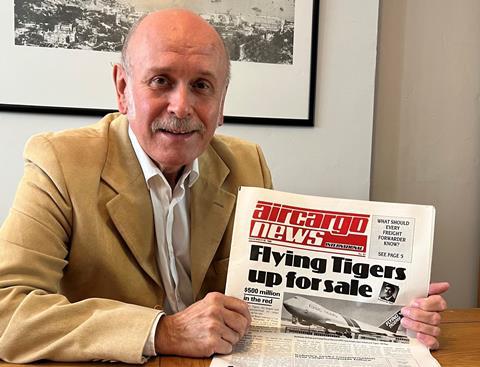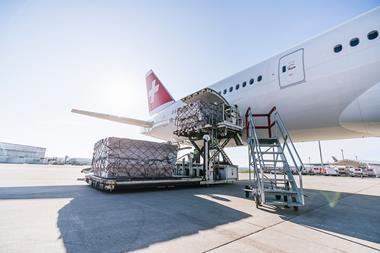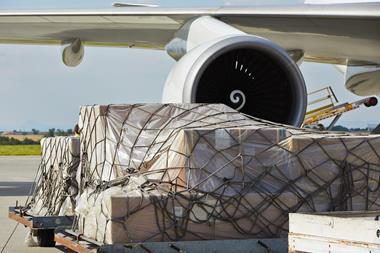
Former Air Cargo News International sales director Derek Jones remembers the frantic –but always hugely enjoyable – first few weeks in the life of Air Cargo News.
It hardly seems possible that this year marks the 40th anniversary of the launch of Air Cargo News International (ACNI), now Air Cargo News. The memory of the frantic nine-week period between setting up the company and releasing our first edition, and that first tough but enjoyable year in business, remains so fresh in my mind.
March 16, 1983 (the date of the first issue) is indelibly carved in my memory. Determined to start with a bang, we had been desperate for an exclusive for the first edition front page, but the industry just would not oblige us.
And then, with only hours to spare before the print deadline, it came: “Pandair is sold”.Pandair was at the time the UK’s biggest IATA forwarder. And we, the new kids on the block, had broken the story.
So, we went into the launch party with pride and jubilation. And I left in a large cardboard box with a pretty kissagram girl, courtesy of a dirty trick played on me by my co-directors, Ray Crane and Nigel Tomkins, and industry friend Ray Dodds of Air81 fame.
I thought it was a genuine case of mistaken identity when the girl burst out of the box and smothered me in lipstick but my protestations fell on deaf ears, and I quickly realised I had been stitched up.
Commercially speaking, March was probably the worst possible time to launch a new title.
In those days, the big advertisers – such as Flying Tigers, British Airways, British Caledonian, Southern Air Transport, Thai Airways and Gulf Air – used to plan and book their next year’s campaign around October to December; if you missed that window, your next chance was a year away.
We struggled on for the first nine months, living hand-to-mouth from one-off feature advertisements.
Then I reintroduced a concept that had worked very well with my previous publication, Airtrade: what could best be described as an in-house ad agency.
This provided potential advertisers with all the help they needed to create attractive and effective ads, and we offered the service at cost as an enticement to spend money with ACNI.
It worked a dream, and unlocked a number of new advertisers.
I also really enjoyed it, as I demonstrated eight years later when I left ACNI’s parent company and launched my own specialist marketing agency for the industry. But that’s another story.
I remember 1984, too: not just as the title of George Orwell’s classic novel, but as a new dawn in our business.
It was as though somebody had thrown a switch: all the campaigns that we had missed out on for 1983 started to fall into our laps.
At last, we no longer needed to rely heavily on those one-off ads, and we were soon able to fund the launch of our own airfreight directory, and to buy an unwanted multimodal monthly magazine (called BritishShipper) from its otherwise consumer‑oriented parent.
The air cargo world was a very different one in those early ACNI days.
Computerisation was the preserve of only the larger carriers and forwarders, who could afford the eye-watering bills for bespoke systems.
UK forwarders still used the dumb terminals of customs’ ACP80 system for their customs entries, so they had to have an office on airport to connect to the local “node”.
The World Wide Web and emails did not exist, and fax machines were only starting to supplant telex as the medium for written telecommunication. And our entire business was based on print publishing, distributed through the mail.
We used to send the whole edition as hot-wax-mounted artwork by rail to our distant printer every other Friday night: a process fraught with perils. On one occasion, the heat in the guard’s van was such that the entire edition slid off its backing sheets and arrived as a sticky mess. On another occasion, the artwork went missing for the whole weekend, requiring a hasty remake.
The industry was much more social in those days: most business was done over a beer or lunch, and you always knew in which pub to find a particular carrier’s cargo manager, or the key execs of a particular forwarder. I know the industry had to mature but, although it sometimes looked more like a playground, it still got the job done.
And it was, frankly, a lot more fun. But, although well concealed, the stress was always there: as evidenced by the number of industry notables who sadly met premature ends.
I could tell many more stories of my years as ACNI’s first sales director, but there isn’t space here.
Maybe, one day, I will write the book. In the meantime, I have many happy memories of the industry, of all the wonderful people I have been privileged to know and the friends I have made.
And I wish everyone who now carries the standard for Air Cargo News many more years of fun and success.
From publishing to marketing
Derek Jones began his media career in 1973. In 1979, he entered the logistics arena, joining Airtrade magazine. Then, in 1983, he was one of the trio that launched Air Cargo News International (ACNI), as its first sales director. In 1990, he left ACNI’s parent company topursue broader marketing solutions for the logistics industry – launching Pilot Marketing with partner Cathy Howe. He remains actively involved in the business.










